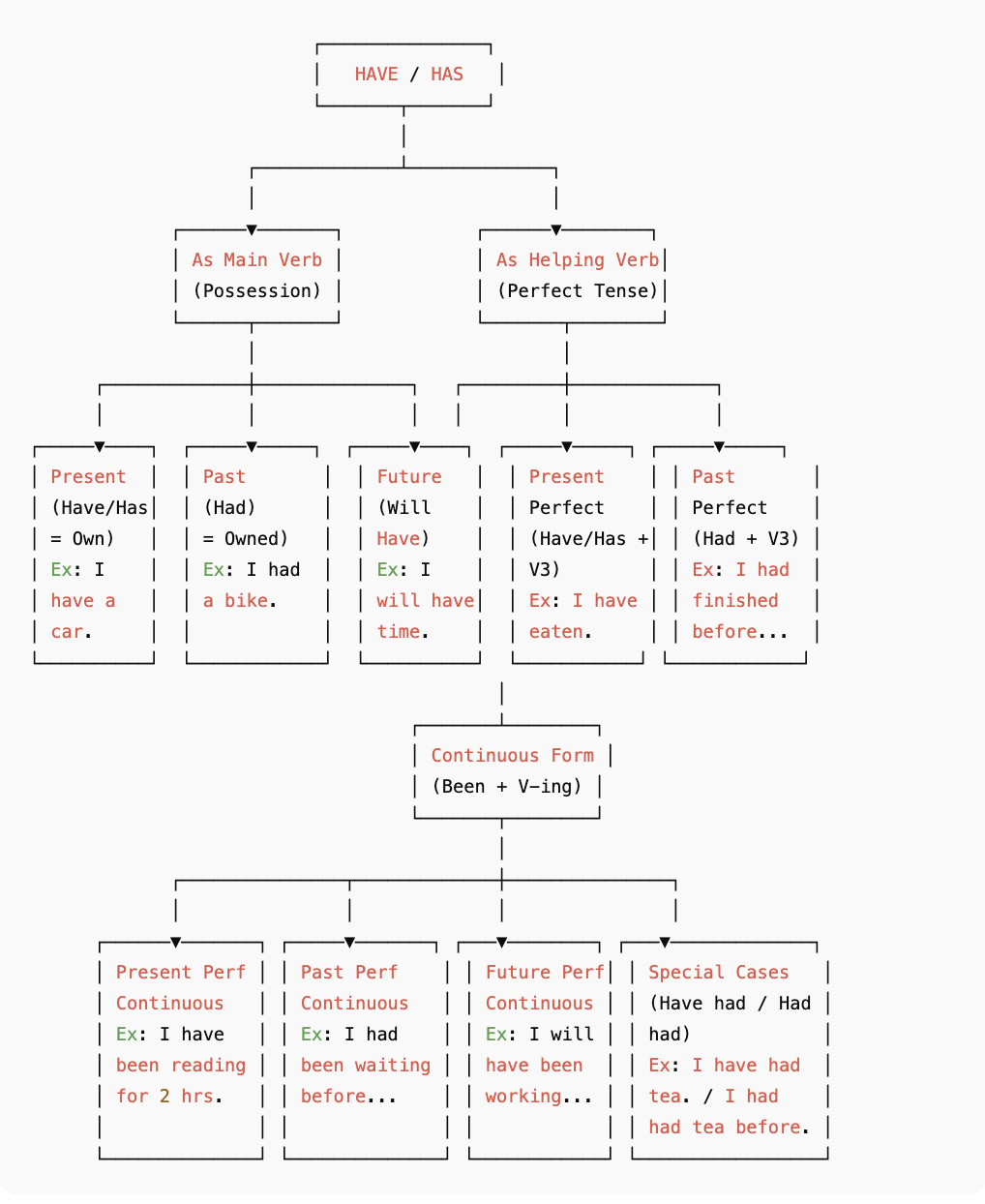Have has had complete chart
Categories: Basic English

HAVE / HAS / HAD – Complete Chart
1. Present Simple
Use: Possession, relation, routine, states.
| Form | Example |
|---|---|
| Affirmative | I have a book. / She has a car. |
| ❌ Negative | I don’t have a pen. / She doesn’t have a car. |
| ❓ Question | Do you have a pen? / Does she have a car? |
2. Past Simple
Use: Possession, relation, past events.
| Form | Example |
|---|---|
| Affirmative | I had a great time yesterday. |
| ❌ Negative | I didn’t have money yesterday. |
| ❓ Question | Did you have a good time? |
3. Future Simple (with “will have”)
Use: Possession or state in the future.
| Form | Example |
|---|---|
| Affirmative | I will have time tomorrow. |
| ❌ Negative | I won’t have time tomorrow. |
| ❓ Question | Will you have time tomorrow? |
4. Present Perfect (have/has + V3)
Use: Completed actions connected to the present.
| Form | Example |
|---|---|
| Affirmative | I have finished my work. / She has gone to school. |
| ❌ Negative | I haven’t finished my work. / She hasn’t gone to school. |
| ❓ Question | Have you finished your work? / Has she gone to school? |
5. Past Perfect (had + V3)
Use: An action completed before another past action.
| Form | Example |
|---|---|
| Affirmative | I had finished work before the match started. |
| ❌ Negative | I hadn’t finished work before the match started. |
| ❓ Question | Had you finished work before the match started? |
6. Future Perfect (will have + V3)
Use: Action completed before a certain future point.
| Form | Example |
|---|---|
| Affirmative | I will have completed my project by Monday. |
| ❌ Negative | I won’t have completed my project by Monday. |
| ❓ Question | Will you have completed your project by Monday? |
7. Present Perfect Continuous (have/has + been + V-ing)
Use: Action started in the past and continuing in the present.
| Form | Example |
|---|---|
| Affirmative | I have been studying English for 2 hours. |
| ❌ Negative | I haven’t been studying English for 2 hours. |
| ❓ Question | Have you been studying English for 2 hours? |
8. Past Perfect Continuous (had + been + V-ing)
Use: Ongoing action before another past event.
| Form | Example |
|---|---|
| Affirmative | I had been waiting for 2 hours before the train arrived. |
| ❌ Negative | I hadn’t been waiting for 2 hours before the train arrived. |
| ❓ Question | Had you been waiting for 2 hours before the train arrived? |
9. Future Perfect Continuous (will have been + V-ing)
Use: Action continuing up to a point in the future.
| Form | Example |
|---|---|
| Affirmative | By 2026, I will have been working here for 5 years. |
| ❌ Negative | By 2026, I won’t have been working here for 5 years. |
| ❓ Question | Will you have been working here for 5 years by 2026? |
QUICK DIFFERENCES
Have / Has → Present possession or Present Perfect.
Had → Past possession or Past Perfect.
Have been / Has been → Experience (visited & returned).
Has gone / Have gone → Went & not returned yet.
Have had / Had had → “Have” as both auxiliary + main verb.
I have had tea. (Present Perfect)
I had had tea before you came. (Past Perfect)
Quick Memory Hacks
Have / Has = Present (I have a car / She has a car).
Had = Past (I had a bike).
Will have = Future (I will have time).
Have/Has + V3 = Present Perfect (I have eaten).
Had + V3 = Past Perfect (I had finished before…).
Will have + V3 = Future Perfect (I will have completed…).
Have/Has/Had + been + V-ing = Continuous Perfect tenses.
Have had / Had had = Double use when “have” is both main verb + auxiliary.